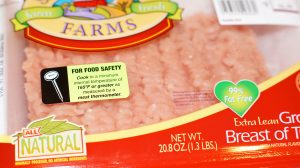What types of labels do you look for in the grocery store: Organic? Gluten free? Non-GMO? Free range? No added sugar? One could write a novel on all of the information that is included on food labels nowadays. You could literally pick up any item in a grocery store and find something wrong with it, something that isn’t good enough for some.
What problems do we have in our privileged first-world society where we have too much food and people complain about it? And just how many of these food labels hold merit?
Folks, I have some news for you: Food companies are lying to you.
Over the years, food companies find trends … reasons to sell you something. Years ago, it was the fat-free diet. Then the Atkins diet, the South Beach diet, paleo diet, gluten free fad, etc. Labels, diets, trends … they’re always evolving and ever-changing.

The problem here is that these labels are deceptive, just like “natural.” Here are just a few of these labels, quickly debunked:
1. There is no such thing as added hormones in poultry or pork, and there’s no nutritional difference in cattle that have been treated with added hormones.
2. All meat is antibiotic-free. If antibiotics are used, the animal must go through a withdrawal period before it can legally go to market.
3. “Cage-free” might not mean what you think it means. More here.
4. Organic does not mean pesticide-free. Farmers need to manage pests, and this boils down to pest pressure, not marketing or labels.
Everything we eat has had their genes modified by humans at some point in history, and nothing we eat exists in its “natural form.” So why do people some people want foods that contain genetically modified ingredients labeled? Well, follow the money. Although GMOs are regarded as safe as their conventional counterparts by every major food safety authority in the world, the organic industry spends nearly $3 billion a year through over 330 different organization leading with fear and “information spin” as an industry to sell their products. By creating an unfounded fear that requires tighter regulations on GMO crops, they are hoping to force them out of the food supply, thereby creating a bigger market share to sell more products in their more than $65 billion wheelhouse.
In my opinion as a farmer, there is nothing wrong with farmers choosing to grow whatever they want. Whether a farm is GMO, non-GMO, organic, etc. that is their decision and there is a market for everything. There is space for everyone. Farmers generally aren’t rude to one another for growing something differently or trying something new.
The unfortunate consequence of these labels is that the food companies and lobbyists tend to create an unnecessary “us vs. them” divide. When food companies use fear against competitors to sell a product, farmers take it personally. Any farmer, regardless of label, cares deeply for the environment, the soil, the animals. This is our livelihood, our family legacy, a career in which we work long hours with pride, passion, and a love of the land. So, for those of us who produce a product that is affordable and doesn’t include a fancy label, it doesn’t mean we care less. Farming comes down to management and not a label.
What do you see as the next food labeling trend? Whatever it is, dig deeper when you see a label and ask the farmers that produce it! Labels are not always what they seem.
Michelle Miller, the Farm Babe, is an Iowa-based farmer, public speaker and writer, who lives and works with her boyfriend on their farm which consists of row crops, beef cattle, and sheep. She believes education is key in bridging the gap between farmers and consumers.



